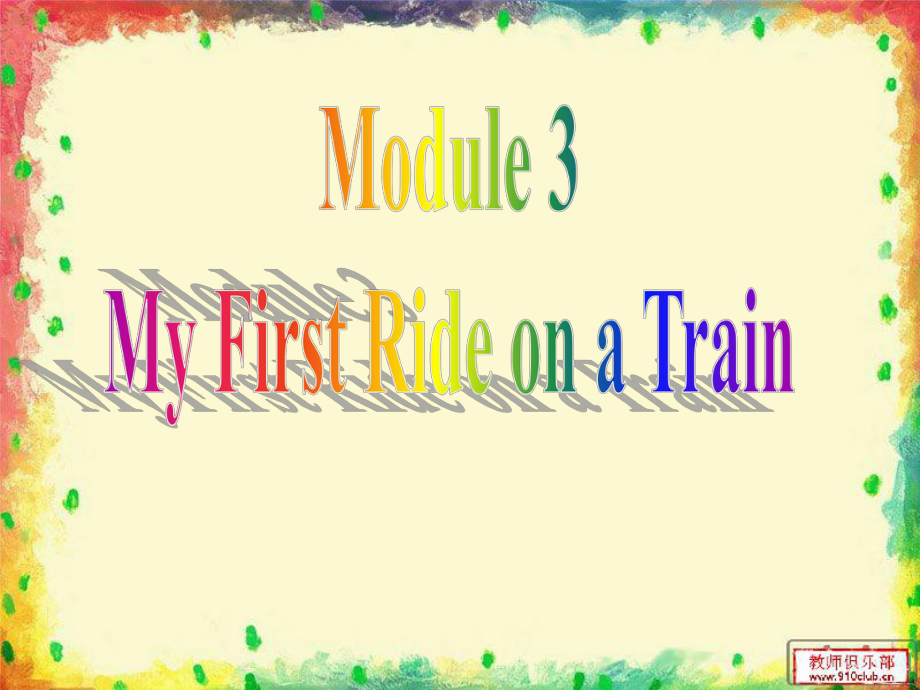《外研社版高一必修1_Unit_3_My_first_ride_on_a_train-grammar_課件》由會(huì)員分享�,可在線閱讀,更多相關(guān)《外研社版高一必修1_Unit_3_My_first_ride_on_a_train-grammar_課件(17頁(yè)珍藏版)》請(qǐng)?jiān)谘b配圖網(wǎng)上搜索���。
1�、 We ate the meals cooked by experts! We saw abandoned farms which were built more than a hundred years ago. the train called the Ghan For many years, trained camels carried food and other supplies. 一個(gè)發(fā)達(dá)國(guó)家 a developed country落葉 fallen leaves一個(gè)打碎了的杯子 a broken glass開(kāi)水 boiled water Grammar I The ed form
2��、 used as attributives1、動(dòng)詞的-ed形式就相當(dāng)于一個(gè)形容詞�,作定語(yǔ)。 2�、過(guò)去分詞做定語(yǔ),表示該動(dòng)作已完成���。 I saw the letter written by her.Tom ate a nice meal cooked by his mother.We all like the photographs taken by our teacher.We liked watching the basket mach played by Kobe Bryant. 思考:分詞所表示的動(dòng)作與被修飾詞之間存在著什么關(guān)系,是主動(dòng)還是被動(dòng)��?3����、過(guò)去分詞作定語(yǔ),分詞所表示的動(dòng)作與被修
3����、飾詞之間存在著邏輯上的被動(dòng)關(guān)系。 4�、-ed分詞既可以作前置定語(yǔ),也可以作后置定語(yǔ)。 前置定語(yǔ)后置定語(yǔ)a concerned look關(guān)切的神色the authorities concerned有關(guān)當(dāng)局a wanted person 被通緝的人jobs wanted需要的工作in a given condition 在一定條件下a present given by the student 學(xué)生送的禮物a used car一輛舊車(chē)a car used一輛用過(guò)的車(chē) 5�����、過(guò)去分詞短語(yǔ)作定語(yǔ)��,其作用相當(dāng)于定語(yǔ)從句。如: the color TV set produced last year =the
4�����、color TV set that were produced last year 去年生產(chǎn)的彩色電視機(jī) a letter written to me by my daughter =a letter that was written to me by my daughter 一封我女兒寫(xiě)給我的信 6���、動(dòng)詞的過(guò)去分詞(-ed形式)作定語(yǔ)�,as adjective, 與-ing 形式作定語(yǔ)的區(qū)別 Past Tense Time Expressions常用的表示過(guò)去的時(shí)間狀語(yǔ)有:recently, during the day, one night, a long time ago, until
5�、the 1920s, in 1925, for many years, just now, at that time, during his middle school years, then, last night/year/week /month, a week /month/ year ago , in the old days Grammar II: Find the following time expressions that appear in “My First Ride on a Train.”Recently A ling time ago During the day A
6、 hundred and fifty years agoOne night Until the 1920sAt (about) midnight In 1925 語(yǔ)法練習(xí)(二)將下列句子譯成英語(yǔ):1. 上周末,簡(jiǎn)吃了一頓由外婆做的好飯�。Last weekend, Jane ate a nice meal (which was) cooked by her grandmother. 2. 昨天晚上,她完成作業(yè)后就上床睡覺(jué)了。She went to bed after she finished her homework last night. 3. 前幾天, Robert 去北京出差了���。 Robert went to Beijing on business the other day. 4. 瑪麗過(guò)去一周來(lái)拜訪我一次����。 Mary used to pay a visit to /visit me once a week.
 外研社版高一必修1_Unit_3_My_first_ride_on_a_train-grammar_課件
外研社版高一必修1_Unit_3_My_first_ride_on_a_train-grammar_課件

